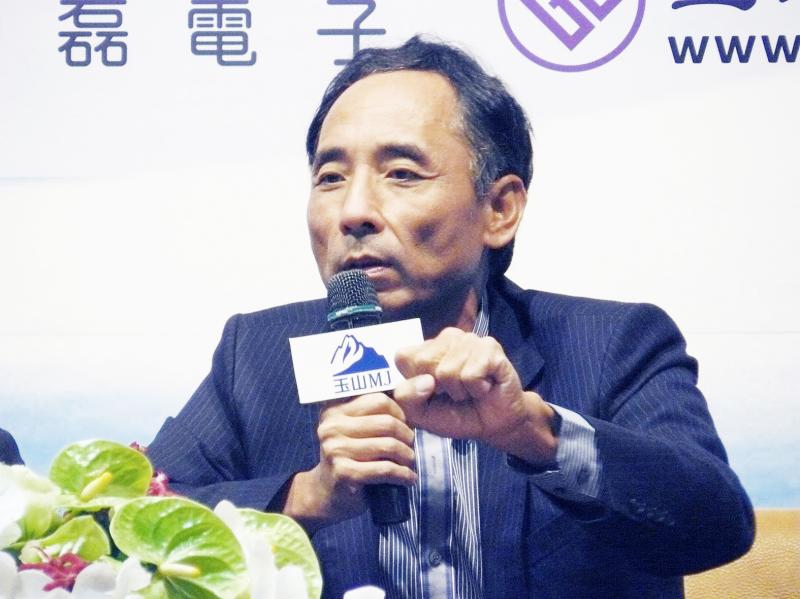Former Nanya Technology Corp (南亞科技) president Charles Kau (高啟全) has reportedly quit his job at China’s Tsinghua Unigroup Ltd (清華紫光) after his five-year contract expired.
Kau joined Tsinghua Unigroup in 2015 after retiring from Nanya Technology, the biggest DRAM chipmaker in Taiwan.
He was the first top executive from a Taiwanese memorychip maker to join a Chinese firm financially backed by Beijing, and had raised concern that he would help China catch up with Taiwan in building its memorychip industry.

Photo: CNA
Last year, Tsinghua Unigroup appointed Kau as chief executive officer of its newly formed unit, Yangtze Memory Technology Corp (長江存儲), aiming to develop and produce China’s first 3D NAND flash memory chips.
Yangtze Memory last month announced that its latest 128-layer 3D NAND flash memory chips have been adopted by customers for their solid-state-drive (SSD) products, according to a statement posted on its Web site.
Kau confirmed that he did not renew his contract with Tsinghua Unigroup when it expired, Central News Agency reported yesterday.
The report quoted Kau as saying that he had completed his mission at the firm and had decided to pursue his own career, declining to reveal his next move.
Kau could not be reached by the Taipei Times for comment as of press time yesterday.
Kau helped found Nanya Technology in 1995. Prior to joining Nanya, he worked at Taiwan Semiconductor Manufacturing Co (台積電), Intel Corp, Fairchild Semiconductor International Inc and Macronix International Co (旺宏電子).
In June, he was tapped by Wiwynn Corp (緯穎科技) to serve as an independent board director at the company, a subsidiary of Wistron Corp (緯創).
Wiwynn supplies cloud-based servers and solutions to global data center operators, such as Facebook Inc and Amazon.com Inc.

Nvidia Corp chief executive officer Jensen Huang (黃仁勳) on Monday introduced the company’s latest supercomputer platform, featuring six new chips made by Taiwan Semiconductor Manufacturing Co (TSMC, 台積電), saying that it is now “in full production.” “If Vera Rubin is going to be in time for this year, it must be in production by now, and so, today I can tell you that Vera Rubin is in full production,” Huang said during his keynote speech at CES in Las Vegas. The rollout of six concurrent chips for Vera Rubin — the company’s next-generation artificial intelligence (AI) computing platform — marks a strategic

Shares in Taiwan closed at a new high yesterday, the first trading day of the new year, as contract chipmaker Taiwan Semiconductor Manufacturing Co (TSMC, 台積電) continued to break records amid an artificial intelligence (AI) boom, dealers said. The TAIEX closed up 386.21 points, or 1.33 percent, at 29,349.81, with turnover totaling NT$648.844 billion (US$20.65 billion). “Judging from a stronger Taiwan dollar against the US dollar, I think foreign institutional investors returned from the holidays and brought funds into the local market,” Concord Securities Co (康和證券) analyst Kerry Huang (黃志祺) said. “Foreign investors just rebuilt their positions with TSMC as their top target,

REVENUE PERFORMANCE: Cloud and network products, and electronic components saw strong increases, while smart consumer electronics and computing products fell Hon Hai Precision Industry Co (鴻海精密) yesterday posted 26.51 percent quarterly growth in revenue for last quarter to NT$2.6 trillion (US$82.44 billion), the strongest on record for the period and above expectations, but the company forecast a slight revenue dip this quarter due to seasonal factors. On an annual basis, revenue last quarter grew 22.07 percent, the company said. Analysts on average estimated about NT$2.4 trillion increase. Hon Hai, which assembles servers for Nvidia Corp and iPhones for Apple Inc, is expanding its capacity in the US, adding artificial intelligence (AI) server production in Wisconsin and Texas, where it operates established campuses. This

US President Donald Trump on Friday blocked US photonics firm HieFo Corp’s US$3 million acquisition of assets in New Jersey-based aerospace and defense specialist Emcore Corp, citing national security and China-related concerns. In an order released by the White House, Trump said HieFo was “controlled by a citizen of the People’s Republic of China” and that its 2024 acquisition of Emcore’s businesses led the US president to believe that it might “take action that threatens to impair the national security of the United States.” The order did not name the person or detail Trump’s concerns. “The Transaction is hereby prohibited,”